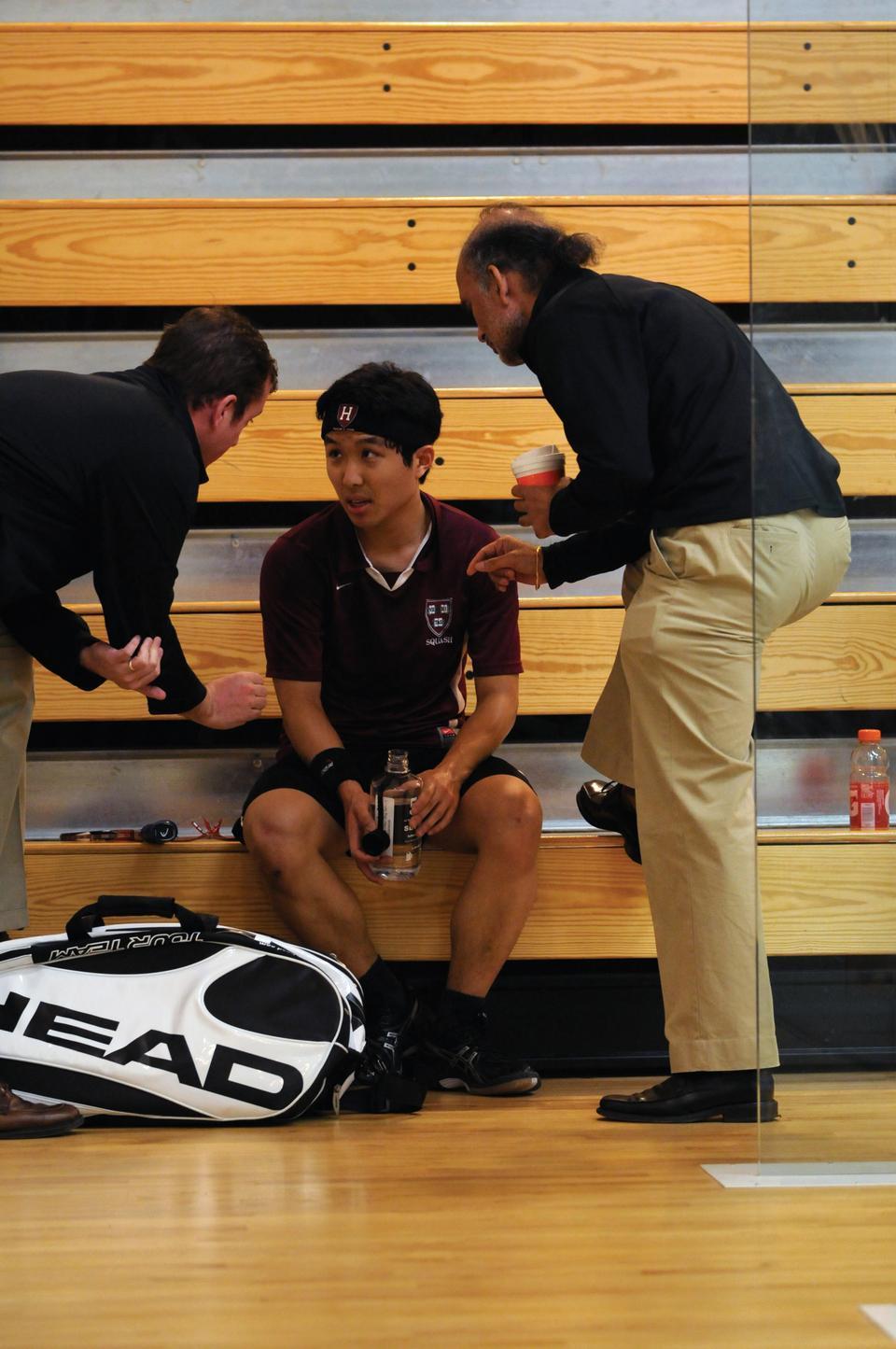
News
Summers Will Not Finish Semester of Teaching as Harvard Investigates Epstein Ties

News
Harvard College Students Report Favoring Divestment from Israel in HUA Survey

News
‘He Should Resign’: Harvard Undergrads Take Hard Line Against Summers Over Epstein Scandal

News
Harvard To Launch New Investigation Into Epstein’s Ties to Summers, Other University Affiliates

News
Harvard Students To Vote on Divestment From Israel in Inaugural HUA Election Survey
Despite Success, Coach To Leave

It was a decision that left some in shock, others in tears, and many more in disbelief.
Satinder Bajwa, the men’s and women’s squash coach who served Harvard for 11 years, told both teams Thursday at the Murr Center that despite recent victories—including the 2010 women’s national championship and two individual titles—his contract would not be renewed for the upcoming year.
“I think everyone’s still in the stage where they’re trying to understand it,” freshman Laura Gemmell said. “Obviously people are sad, and they really respect Baj as a coach.”
“This situation sort of came as a shock late last week,” junior Eliot Buchanan said yesterday afternoon. “So we obviously have a lot of questions that deserve to be answered.”
Some of those questions were answered yesterday at a meeting with Athletic Director Robert L. Scalise that nonetheless left several players unsatsified with the rationale, the process, and the decision itself.
THE REASONING
Scalise was unable to be reached for comment, but freshman Charles Gertler said that the rationale for Bajwa’s contract non-renewal was three-fold.
Spurning the chairs the team had laid out for him, the athletic director opted instead to stand—a move that Gertler said set the tone of the conversation—and said that while Bajwa did have a strong record on the court, breaches from administrative protocol, an inability to be a “good community member at the athletics department,” and recruiting deficiencies forced the department to part ways with the squash veteran, according to Gertler.
In an interview, Bajwa called Scalise’s administration-related accusations “very vague” and said that he maximized performance given the constraints of the admissions office.
At the meeting, according to several attendees, Scalise laid the groundwork for future interactions with the team about finding a new coach, which freshman Jason Michas called “ironic” given the lack of communication he said existed leading up to the non-renewal.
“Everyone was nervous going into [the meeting],” he said. “Originally we felt a bit slighted throughout the entire process, because we never found out what happened until quite recently.”
Bajwa was notified of the contract non-renewal just as the men’s squash team completed evaluation forms, according to Gertler, which he said highlights the administration’s omission of the teams’ opinions.
“They claim they made their decision in our interest, but when we’re not even considered, it’s a little upsetting,” he said.
THE RUMORS
Bajwa’s contract non-renewal was colored by rumors regarding alleged racism on the part of wealthy alumni.
Albert F. Gordon ’59, a significant donor to the Murr Center and self-described “business friend” of Bajwa, said that alumni have leveraged their financial influence to engineer the end of Bajwa’s tenure at Harvard.
Bajwa refused to comment on these allegations, and players interviewed for this article said they did not believe them to be true. An e-mail sent by Dean of the College Evelynn M. Hammonds and Vice President for Human Resources Marilyn Hausammann to Gordon said that the decision not to renew Bajwa’s contract was not discriminatory.
But Bajwa has not been bashful in his ties to the Indian subcontinent. In January, he took the women’s team on a trip—subsidized by Gordon—to India, where, in addition to playing matches, team members helped underprivileged children and trained them in squash.
Gertler believes that all of these efforts were just the beginning of creating international ties between Harvard and the larger squash community.
“Baj was leaving the program just as it was getting started, just as we were building a relationship with India, just as we were starting to do these humanitarian efforts,” Gertler said. “They’re more interested in having someone who gets along with people in the office than they [are] someone who wins championships and does humanitarian efforts.”
THE RECORD
A previous individual winner of the U.S. National Championships, Bajwa led the Crimson to six women’s and five men’s Ivy League titles during his tenure. This past season, the women’s team took the Howe Cup—the team national championship—while co-captain Colin West and Gemmell won individual national titles.
But these successes came as part of a general downward trend on the part of the men’s team, sliding from second at the beginning of Bajwa’s tenure to fifth this year.
Despite the noticeable drop in Harvard’s national standing, Bajwa called the trend a “cycle.”
“Three years ago my women were number five, and we had an amazing moment, and I felt that the men are in that same moment because right now they’re number five,” he said. “And the way the women three years ago went from number five to undefeated, I really felt that the men were headed in that direction.”
Team members were no less optimistic about Harvard’s prospects, but added that what Bajwa provided was more than just statistics and rankings.
“It’s hard to understand in a sport that sometimes people have to win and people have to lose, and it can’t be about the winning and losing,” junior Alisha Mashruwala said. “The coach is there to be more than just a coach. He’s a teacher. He’s a parent. He’s someone who brings the team together, and looking at the men’s and women’s team to see how bonded the teams are, you realize Baj has done great things for us.”
—Staff writer Brian A. Campos can be reached at bcampos@fas.harvard.edu.
—Staff writer Alex Sopko can be reached at sopko@fas.harvard.edu.
—Staff writer Naveen N. Srivatsa can be reached at srivatsa@fas.harvard.edu.
Want to keep up with breaking news? Subscribe to our email newsletter.
